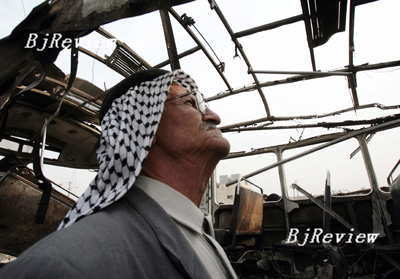|

In the three years since the U.S.-led invasion of Iraq, the Middle Eastern country has endured continuous violence and turbulence, and the security situation appears to be worsening as the year draws to a close.
The bombing of the Al Askari Mosque in Samarra, one of Shiite Islam's holiest sites, in February indicated that the country was entering an even more difficult period. Besides the intense conflict between U.S. troops stationed in the country and anti-U.S. forces there, the deadly clashes among various political and religious factions are escalating, and appear poised to spin out of control. Given the deteriorating security situation in the country, many observers, including retiring UN Secretary General Kofi Annan, have warned that the country is involved in a civil war.
The worsening security situation has directly led to the deaths of innocent Iraqi civilians. A report by the United Nations shows that in May and June alone, a total of 5,818 Iraqi civilians lost their lives in violent events and 5,672 were injured. It is estimated that more than 3,700 Iraqi civilians died in violent incidents in October, the highest death toll recorded in one month since the United States launched its invasion in the spring of 2003. Statistics also indicate that since the beginning of the war almost 600,000 Iraqi people have died in the violence and some 1 million Iraqis have left their homes and become refugees.
The chaotic state has gravely affected Iraqi people's daily lives. According to statistics, 85 percent of Iraqi families often encounter power cuts, 45 percent of families lack drinking water and over half of the population is unemployed or partially employed.
Iraq's current oil production is only 1.5 million barrels per day, far less than before the war, and the oil-rich country must import oil from its neighbors.
The United States has also paid a heavy price. According to estimates, the United States has spent $400 billion on Iraq since the start of the war. Joseph E. Stiglitz, an American economist who is a Nobel laureate, estimated that the direct and indirect economic cost of the war for the United States is very likely to be $2 trillion.
Growing discontent
Apart from the economic costs, the number of casualties suffered by the U.S. military is climbing. The death toll is approaching 3,000 persons, with the number of injured exceeding 25,000. More and more U.S. soldiers are being sent home because of psychological problems. The bad situation in Iraq has aroused growing discontent with the Bush administration among the U.S. public, and become a major political burden for President George W. Bush.
Although the reasons behind the current turmoil in Iraq are complicated, the root lies in launching the war in the first place and in pursuing the wrong policies in the country. Despite the strong opposition of the international community, the United States launched the war on the pretext of fighting terrorism, preventing former Iraqi President Saddam Hussein from having weapons of mass destruction and bringing democracy, trying to "transform" Iraq of its own will. But things turned out the opposite of what Washington expected. The war triggered intense anti-U.S. sentiment in Iraq and even in the entire Middle East.
| 